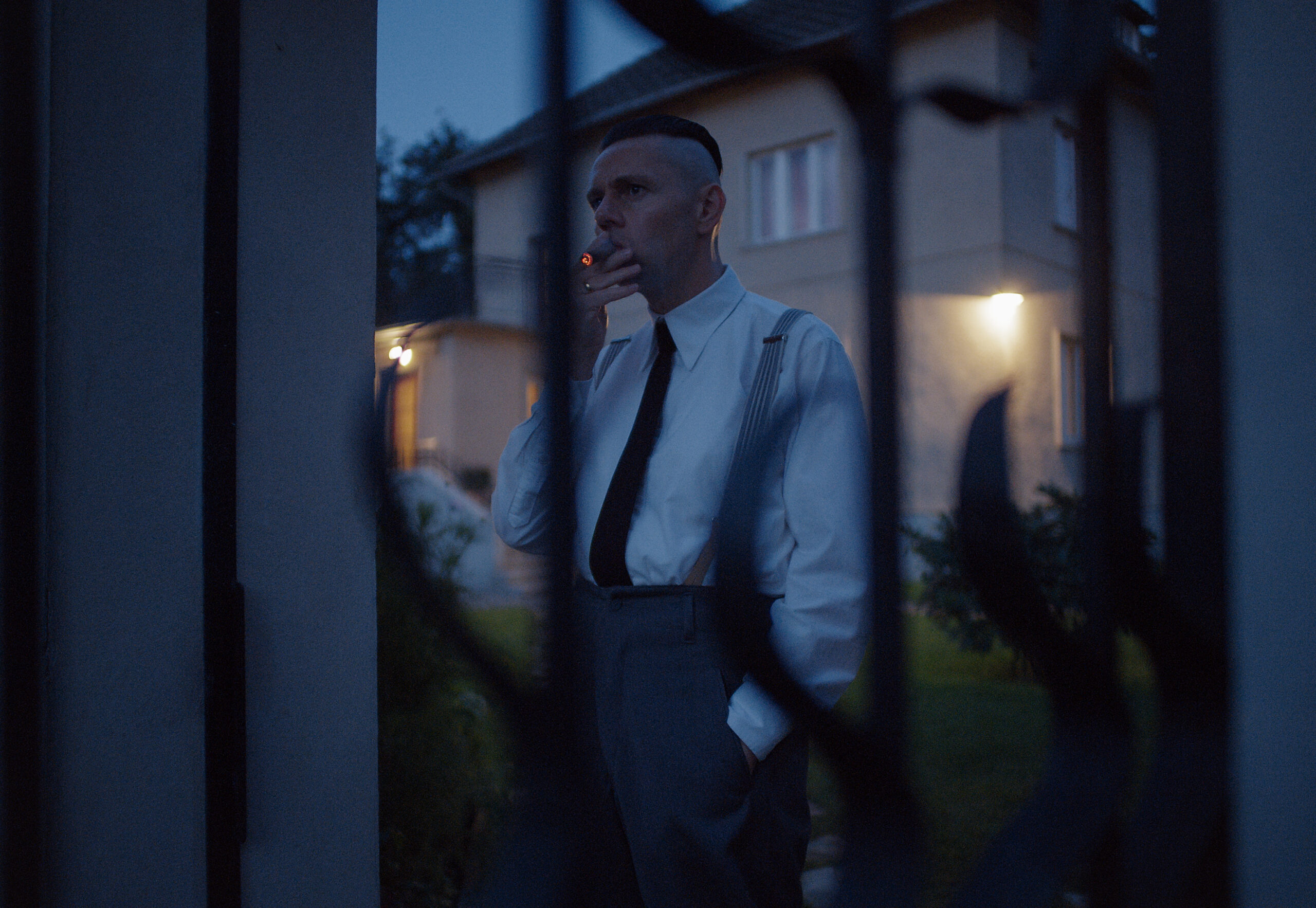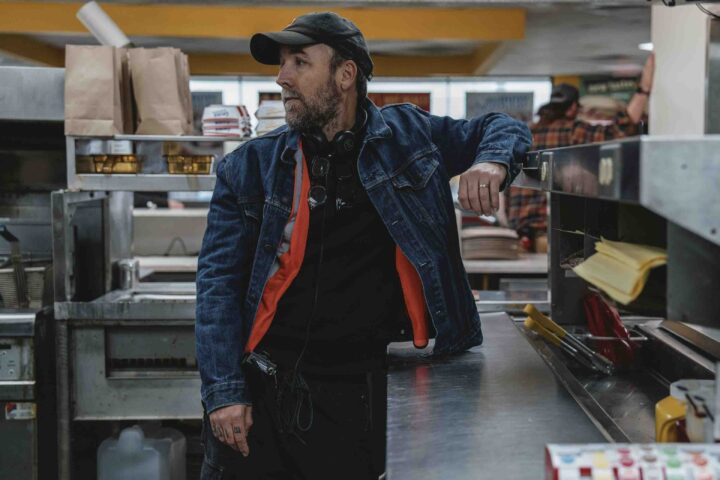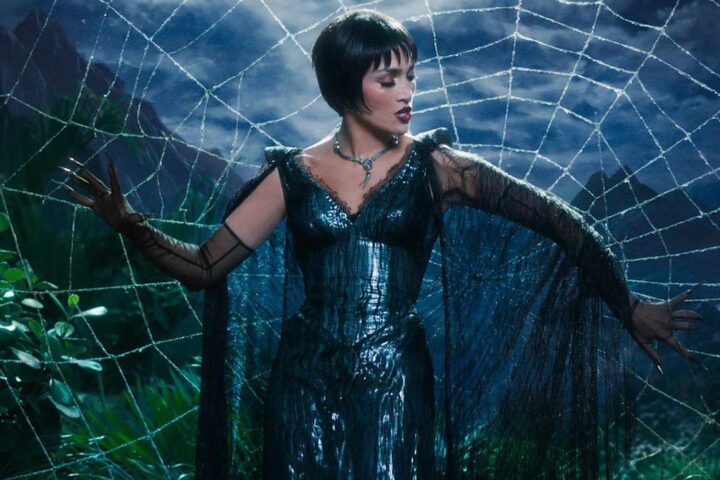In Jonathan Glazer’s icily austere The Zone of Interest, German musician and actor Christian Friedel was tasked with a dauntingly antithetical assignment in playing real-life Auschwitz commandant Rudolf Höss: to convey an architect of doom as a mild-mannered family man. No, these were not individual roles but a provocative duality within the same man, the Nazi official who orchestrated death camp atrocities while serving as an ordinary husband to his wife, Hedwig, played by Sandra Hüller, and father to their five children, presiding over both an idyllic family home and adjacent Holocaust horrors.
In a fascinating performance, Friedel presents a model of closed off calculation as the white suited Höss shuttles between designing gas chambers for maximum productivity to fulfilling family and social requirements, a portrait of next door evil and domesticity coexisting in the cold light of day. The longest serving commandant at Auschwitz, Höss was ultimately brought to justice post-war and swiftly executed—next to the crematorium at Auschwitz, no less—for facilitating the deaths of more than 3 million (a figure he would maintain, at trial, was 2.5 million). In a disarming characterization serving a thematically didactic movie exercise about the banality of the evil that men do, Friedel mixes man and monster for a most unsettling portrait.
When you meet an actor that has successfully portrayed a frightening villain onscreen you sometimes have a degree of curiosity about the art-life mirror and what to expect in person. I recently caught up with Friedel, the forty-four-year-old Dresden native and star of film, television, stage and pop music, who in person is boyishly handsome, energetic and worlds away from malevolent onscreen counterpart. Upon meeting the real life version, the sophistication of his Zone characterization became instantly clear. During our chat, Friedel shared his challenges in playing Höss, namely excavating the human or ‘normal’ side of one of history’s most heinous villains in a performance forcing us to consider the capacity of an otherwise average man for committing, and compartmentalizing barbarism. How could Höss sleep at night? According to Glazer and Friedel, perfectly well, for the most part.
The Zone of Interest gave you the opportunity to construct an unusual depiction of evil personified. How did you approach what was going on inside of Rudolf Höss? It must have been a challenge to determine how to play him.
Christian Friedel: Absolutely. That was the whole challenge—to give this evil person a human face, but also to keep all these atrocities and familiar pictures in my mind and to find a way so that we would never see them. We only see him as a father and an ‘ordinary’ human being who is sometimes boring or interested in nature or something. He is always thinking about his work, but the challenge in my interpretation was not to share this with the audience. To find and create the normality, or the banality, was a real intense challenge for me as an actor, and to do it in a very believable way. Sometimes we see a perpetrator or an evil person and can say, ‘No, it’s not me’ and we have a distance. But here (I wanted) to find a way so that we could not say this, and that we are very close to him or, in a way, pull the trigger together with him.
I was struck by one of the central themes of the movie, which is that there could be this matter-of-fact quality to doing evil things, and they might be performed because they’re considered part of a job. In fact, this was part of Höss‘ defense at trial. Do you think in his private moments he considered the human implications of what he was actually doing, or was it easier just to separate from that? Certainly at the end of the movie there’s a suggestion that maybe there is something.
CF: Yes, at the end of the movie I think his body tells the truth. And that scene, as Jonathan said to me, it was one of his favorite scenes of Rudolf Höss—the compartmentalization and how he shuts all the doors like a daily routine. And I think this is a picture of what’s going on in his mind.
To close down from it.
CF: To close down from it, to make a wall and ignore all of these atrocities and to only believe that what he is doing is important and he had to do it. He is not thinking about the consequences of what he is doing or perhaps he thinks all of these prisoners are like animals in a farm. So I don’t know- because the body reacts and the body tells the truth, the soul tells the truth and the body fights against his mind and against his ignorance in a way.
I thought something similar- have you seen Oppenheimer?
CF: Yes!
There is a scene in Oppenheimer where they’re deciding which Japanese cities would be the best targets for the bombs. The discussion has little to do with the human toll.
CF: Yeah, this was a really impressive scene. Yes. I really liked Oppenheimer and I’m a huge fan of Christopher Nolan. And yes, absolutely. And it reminds me- did you see Homeland?
Yes.
CF: I don’t know which season it was, but there was a scene where they look at a small monitor and they decide, ‘Okay, we have to drop a bomb there’ (as if it is) just a normal thing. But they forget the consequences or dimensions of what they are doing.
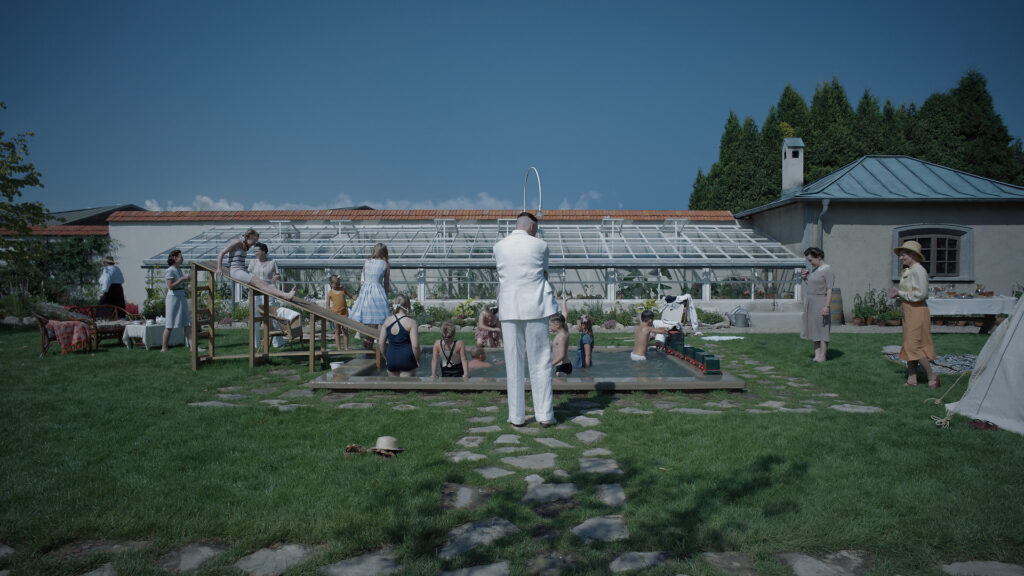
There is a scene The Zone of Interest that directly illustrates this idea, in which you and the other Nazi officials are looking at the plans for the gas chambers and the discussion is about their engineering, design and efficiency. It’s not about the human implications. It’s about how will it work most effectively and might be made to work equally well in other locations; like a normal, daily work conversation.
CF: Absolutely. You’re right.
Can you speak about Sandra Hüller and the scene where you reveal to her that you’re going to relocate the family? The two of you have this discussion on a dock in front of the river and the water is moving very quickly.
Yeah, very quickly.
And there’s this very domestic discussion about moving the family, which could be in any movie, right?
CF: Absolutely and anywhere in life. Sandra and I had met years ago for another feature film, Amour Fou, by Jessica Hausner. I played Heinrich von Kleist and she played my cousin. We had a very deep connection and we felt like we had known each other since we were born. We became very close friends and this energy helped us to create this ‘professional’ couple, because I think the marriage is professional. Maybe in they past they were in love, but now she is the queen of the house and garden and he is the king of his own horrible, created castle.
We shot this scene across different days and I was really impressed watching Sandra because she’s a fearless, amazing actress. And because of the multi-camera system we used, we had the possibility to do variations without thinking about continuity or technical interruption. We would do one take, figure it out, speak about it and then do another one.
Almost theatrical in a sense.
CF: It was a theatrical, but in a theater you play for an audience. It reminded me a little bit of the theater because in the theater you create the whole story from the beginning to the end without interruptions. And it was great to work with her. I am really thankful. When I met Jonathan for the first time and he shared his vision with me and we were talking about this family, the first thing I asked him was, ‘Is it Sandra? Will she be playing?’ And he started to laugh because Sandra was in his mind. And I also had the feeling that we would be a great match working together to create this couple.
She recently commented that across her career she has refused to play a Nazi, and in approaching Hedwig Höss she did something interesting, which was to withhold from the character; the woman. She did not want to grant her feelings to this character. I want to ask you about playing a Nazi. I believe you had mentioned in a recent interview that as a young German actor you will at some point inevitably play a variation on a Nazi. But from a 2023 cultural lens trained on approaching someone like Rudolf Höss, what is your take as a modern German conveying this type of character? What does that mean, if anything? I don’t know if I’m articulating correctly.
CF: That is a really good question because the challenge here was to give these Nazis a human face; to create a human being. And in every role in my career so far I try to find a way to create a human being. I played a Jewish character in a movie. I played a resistance fighter in a movie. I played a photographer in the series Babylon Berlin. So yeah, I tried to do that here in the same way. Yes, he was a Nazi, but the challenge was to not show him as a cliche, because very often we create some cliche of Nazis. When I was wearing the uniform for the first time, I had goosebumps because it changes your body. I think this character sometimes feels like a little boy who’s wearing a uniform. And to find a way, yes, with this modern perspective, because Jonathan wanted to make a modern movie with a modern view on this character, and these scenes or situations we were searching for—to be a father, to be interested in nature, to have a birthday party, to have a dinner—it could be in our time.
So yes, my way to create this character was different. Sandra and I talked a lot about this and I was really grateful that she was there. We had phone calls or dinner every day to talk about it because there were days when we were unsure what we were doing and would have to protect ourselves. From the beginning, Sandra was so careful to protect herself where sometimes I was a little bit naive. So I was connecting sometimes with myself and my emotional archive because I was searching not only to think about what was going on in his mind but to think, ‘Okay, what’s the right feeling or emotion for this particular situation?’ It was a challenge to do this so that we did not only see him only as an historical person in an historical context, but that we could see and believe him as a mirror of our times. I hope that answer was not too complicated!
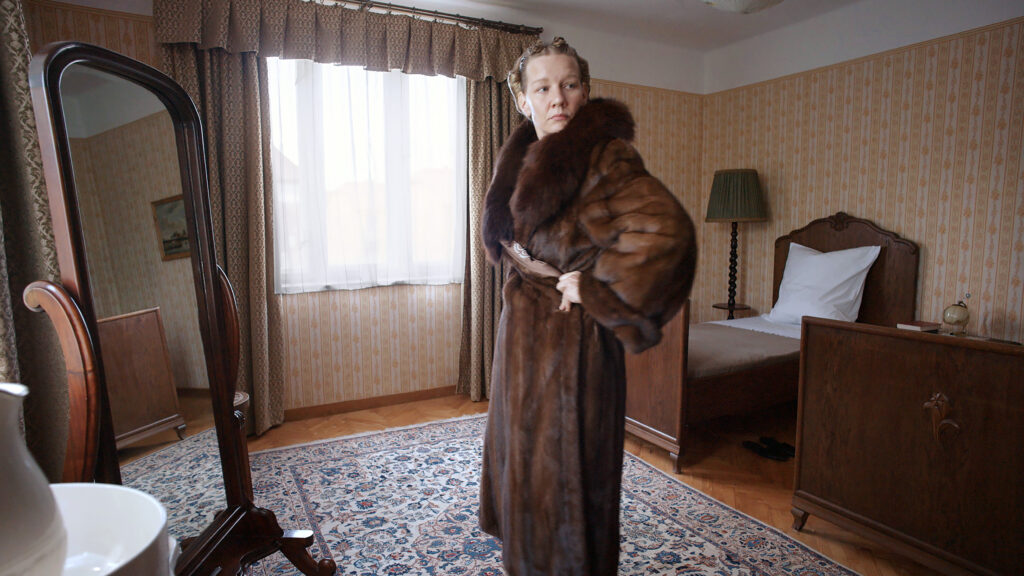
I imagine that the visual design of the finished film was not fully conveyed as you were acting. So for example, some of the very striking moments are visual juxtapositions. In one moment, we look at a party happening on the family lawn while in the background of the same shot we see smoke coming from a train that is entering Auschwitz; from Jonathan’s vantage point we can see this, but the Höss family cannot. I assume some of these tableau-style moments were created in post-production. For you, when you saw the film for the first time and witnessed such moments—as well as the sound design that comes from the other side of the Auschwitz wall—what was the experience observing what Jonathan had crafted around you?
CF: The second movie here is the movie you hear, right? From the beginning, Jonathan was very transparent with us. Sometimes what we were seeing or hearing was very precisely written down in a script, and we knew what would happen. It was great that we shot in silence, which allowed us to create this contrast to what would follow in the post-production. And I was impressed when I watched the movie for the first time. It was uncomfortable for me, yes, but I was impressed to hear this absolutely unbelievable, great music from Mica Levi, and to see the effects of the camp—for example, the scene when I smoked the cigar and then you see the chimney in the background. We knew from the very beginning that was coming, but it is different when you’re watching the movie for the first time. I was impressed!
There is the movie you see and the movie you hear, and I think the sound design together with this incredible soundtrack- I was really surprised, because I couldn’t imagine how the music for such a movie would sound. And then I was impressed to see Jonathan’s decisions, because there was a lot of material and scenes that did not make it to the final cut. But I really understand that. And as an actor, sometimes I’m sad because they were very emotional. But I really understand his decisions. The most surprising thing was at the end of the movie. I knew there would be documentary footage from the real camp and from the museum, but then Jonathan cut back to Rudolf. When we saw it, Sandra and I immediately thought that was a genius cut.
This interview has been edited for length and clarity.
